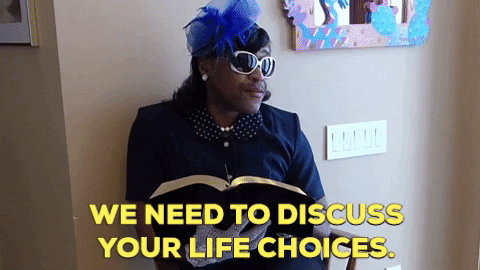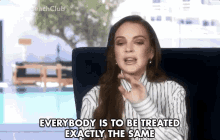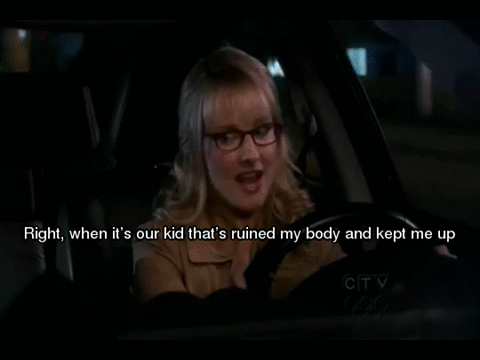Childfree not Childless
[Estimated reading time: 11 minutes]
People...I love words. I like to use as many different ones as possible each day. Because I understand that language is important. When we’re communicating with other people, the exact words we choose carry weight. Sometimes two words can appear to have the same meaning, but have hugely different impacts. The difference between ‘sex’ and ‘gender’ is the difference between anatomy and identity. The difference between Ms and Mrs is a hard won acknowledgement that a woman’s marital status is not relevant to how we treat her. And the difference between ‘baby’ and ‘foetus’ is the difference between two vastly different opinions around reproductive rights. Words aren’t inherently bad, but using them in the wrong context can cause problems.
So today I wanted to talk about the difference between ‘childless’ and ‘childfree’.
A person who desires to become a parent, but currently has no children is childless. They’ve made the choice that children are something they wish to have as part of their life, but at this point don’t have any. This could be for a variety of reasons; the biological inability to have them, not having met a partner yet, or not being ready to start a family. But the implication is clear; there is a desire to have a child or children in their life.
Childfree on the other hand is a term we hear less often. To be childfree means making the decision that your life will be free from children. A childfree person neither wants, nor anticipates wanting them, at any point. People who are childfree are committed to living out their entire lives without procreating. This is not a small fringe movement either, according to the Australian Bureau of Statistics, 24% of women are making the choice to be childfree for life and it’s expected to reach 30% by the next census results.
Selfishness has nothing to do with being childfree.
Despite the fact that being childfree is a choice that an individual, or couple has made and that it really only impacts them, those that choose to go public about their decision face extensive scrutiny from the world at large. Most discussions and representations of childfree people tend to be negative.
An analysis of media representations of childlessness in the United Kingdom revealed selfishness as an explanation of the phenomenon. Surveys of parents, students and the general public demonstrate that women without children are considered to be selfish, deviant, undesirable, empty and ultimately unfeminine.
This is despite the fact that, for many people, the decision to be childfree comes from a place of selflessness. The actual reasons for being childfree are as diverse as the individuals within the community.
People who are concerned about passing on genetic issues and don’t want future children to suffer needlessly.
People worry that their own mental or physical health issues would make them unfit parents.
Others worry that their financial situation will never be viable enough to raise a child with enough opportunities.
Some worry that the current state of the world is too unkind a place to raise future children.
People who were raised in a home with domestic violence are often reluctant to have children of their own.
Others take an environmental stance and recognise that not having a child is the most significant decision a person can make to lower their impact on the globe.
And many more recognise that having a child is simply not something they want, in much the same way people don’t want to own pets or a car.
All of these people recognise that a child that isn’t wanted isn’t going to be fair on either them, or the child.
None of these are selfish reasons, they are decisions that can only reached by putting a potential child’s needs before the personal desire to be a parent.
Contrast that with the reasons given for wanting children and it becomes hard to understand where this perception of selfishness comes from.
In Australia, there were 311,104 births registered in 2016.
During the same time period, there were 315 adoptions.
This means that for many people, the desire to have a child is not intrinsically linked to wanting a child, but to wanting their own child.
And yet it’s estimated that around 50% pregnancies in Australia aren’t planned which means that it’s not even necessarily about wanting a child, so much as it is simply going along with it once it’s happening.
In 2016, over 47,000 children were placed in out-of-home care by Child Protection Australia the same year, with over 60,000 cases of substantiated abuse being reported. These are children that have been subjected to verified cases of emotional, physical, sexual abuse or neglect. Perhaps if these parents had put as much thought into their reasons for wanting/having children as their childfree counterparts, these statistics would be lower.
So when are you having kids?
Both childfree and childless people face a litany of social interactions that range from uncomfortable to outright offensive. In social settings both are often asked why they don’t have children; because, in our society, we view procreation as a social default.
Social defaults are a phenomenon that we engage with almost every day, but that many people don’t recognise as applying to not having children. For instance many people will make the assumption that the person they’re talking to is heterosexual, because being straight is seen as the social default. Australians have a bad habit of asking people of colour where they’re “really from” because being white is viewed as a social default. And when it comes to not having children, people feel entitled to know why.
This is regardless of the fact that many people without children are unable to have them. A fact that should really be enough to dissuade people from asking in the first place. If there’s a possibility that the person you’re talking to has been struggling with infertility, that they’re going through the emotional ordeal of trying to conceive and being unable to, that they might have recently experienced a miscarriage or other similarly intense event - why would you risk bringing that up? Especially if it’s just for the sake of your curiosity about their family life. If a person does have children, they’ll usually come up in conversation naturally - you don’t have to ask.
But even on the political stage, Australians aren’t immune from commentary on their family status. Australia’s treasurer at the time, Peter Costello, decreed that when it came to kids, Australians should have ‘one for the husband, one for the wife and one for the country’. As though it never occurred to him that having ‘none’ was also an option.
In 2007 Senator Bill Heffernan implied that Julia Gillard was unfit to lead the country because, “I mean anyone who chooses to remain deliberately barren… they’ve got no idea what life’s about.” Because achieving the highest office in the land still comes second to being a mother. Obviously this is why we have such a rich history of maternal Prime Ministers.
The choice about whether or not to have children is a deeply personal one between two people. It involves conversations around sexual intimacy, personal finance, long term plans, career aspirations, not to mention personal ethics and mental and physical health.
But despite the private nature of this information, perfect strangers feel entitled to weigh in on an individual or couple’s final decision.
Ultimately, you don’t know what’s going on in someone else’s head, in their body, or in their relationship - so don’t ask them about children and certainly don’t try and disagree with them if they give you an answer that’s different to your own.
No one else knows what’s best for you
Commentary from anti-childfree audiences will often revolve around happiness; that children bring a joy to life that can’t be found through any other avenue. However a study from a research centre in Canada produced different results. The study compared the experiences of childfree women to their childbearing counterparts.
It found that 70% of women had made the decision to be childfree before the age of 29, further reinforcing that for the majority of childfree people it’s a conscious decision, not an accidental status.
84% said that not having children had a positive impact on their career, and the only significant negative impact reported was that they were expected to pick up the additional workload left by colleagues with children.
96% reported advantages in their personal lives as a result of not having children.
30% even said the decision had strengthened their relationship with their partner.
It’s easy to believe that people who are opposed to the childfree are limited to individuals with antiquated attitudes towards women and the role of motherhood. Sadly though studies on social perceptions of the childfree have shown that there’s no gender bias around these attitudes. Leslie Ashburn-Nardo, a psychology professor at Indiana University led a study into the moral outrage that people feel towards childfree individuals. She pointed out that,
“There was no gender gap in how the non-parents were viewed; participants believed both child-free men and women were less likely to lead happy lives.”
Women who are childfree can be seen as ‘unnatural’ and denying their partners the right to be a father. Men who are childfree can be seen as immature individuals with a Peter Pan complex, who simply haven’t caved in to their partner’s demands.
Women are often told that they’ll change their mind when they meet the right man (often in spite of the fact that they’re either currently in a stable relationship, or not attracted to men in the first place).
This is all on the milder end of the spectrum compared to much of the commentary that childfree people receive, particularly online.
When 29 year old Holly Brockwell wrote an article about her difficulty in accessing permanent contraception as a childfree person, she received a litany of abuse. Brockwell told Mic,
"The insults were all ones that are only used towards women — horrible, degrading words that I wouldn't say to anyone, no matter what they'd done. One of the nastiest tweets talked about crowdfunding an operation to render me physically unable to speak. I think that says everything about what the trolls want.
They want women like me silenced.
They want to take away our power to be heard."
And Brockwell is far from alone in this experience of both the abuse, and the difficulty in finding permanent contraception options.
Children are a choice.
Reproduction is a choice; it should not be an expectation. No one owes the world children. And no child should be brought into the world to parents who are anything less than exhilarated to have them.
Despite this though, many people face intense pressure from family members to stick to the social script; love, then marriage, then a child or several. If you’re the person placing these expectations on others...stop.
Before you ask someone whether they have or want children, ask yourself if there’s a different question that you’d rather ask (and if you can’t think of one, here’s a handy guide for you). Is there something else you could ask them in order to get to know them better. Perhaps ask if they have pets, or where their last holiday was, or what was the last movie they saw. These might seem like slightly more obscure ice breakers, but none of those questions involve intimate details about a person’s sexual relationship, their physical health, their financial stability or their personal ethics around procreation. You’re not going to risk emotionally traumatising a childless person by asking them about their holiday destinations.
If you don’t know a person well enough to know whether they have children, then you definitely don’t know them well enough to tell them that they should have them. If someone tells you they don’t have children and/or aren’t planning on any, don’t tell them that they’ll change their mind or that they’re missing out. You literally do not know that, and it has nothing to do with you. Children are a choice, you’ve made yours, let others make theirs.
If you are childfree and your partner, spouse, or significant other is trying to pressure you into having children and you know that you do not want them - that is reproductive coercion. It is not okay, it is abuse.
If you’re facing scrutiny from family members, friends, or even casual acquaintances, remind these people that it’s your body, not theirs, and therefore it’s your choice whether you’re going to use it to create children or not. You don’t owe anyone children; you were not put on this earth as an incubator or inseminator, you are a full and complete human being with or without offspring.
Be brave, be strong, and know your mind and don’t let the world tell you that the decision you’re making is shameful or wrong, just because it is different. You are the best person to decide what you want from life, and there is no shame in not wanting to have children.
That is all.
You may go now.




















